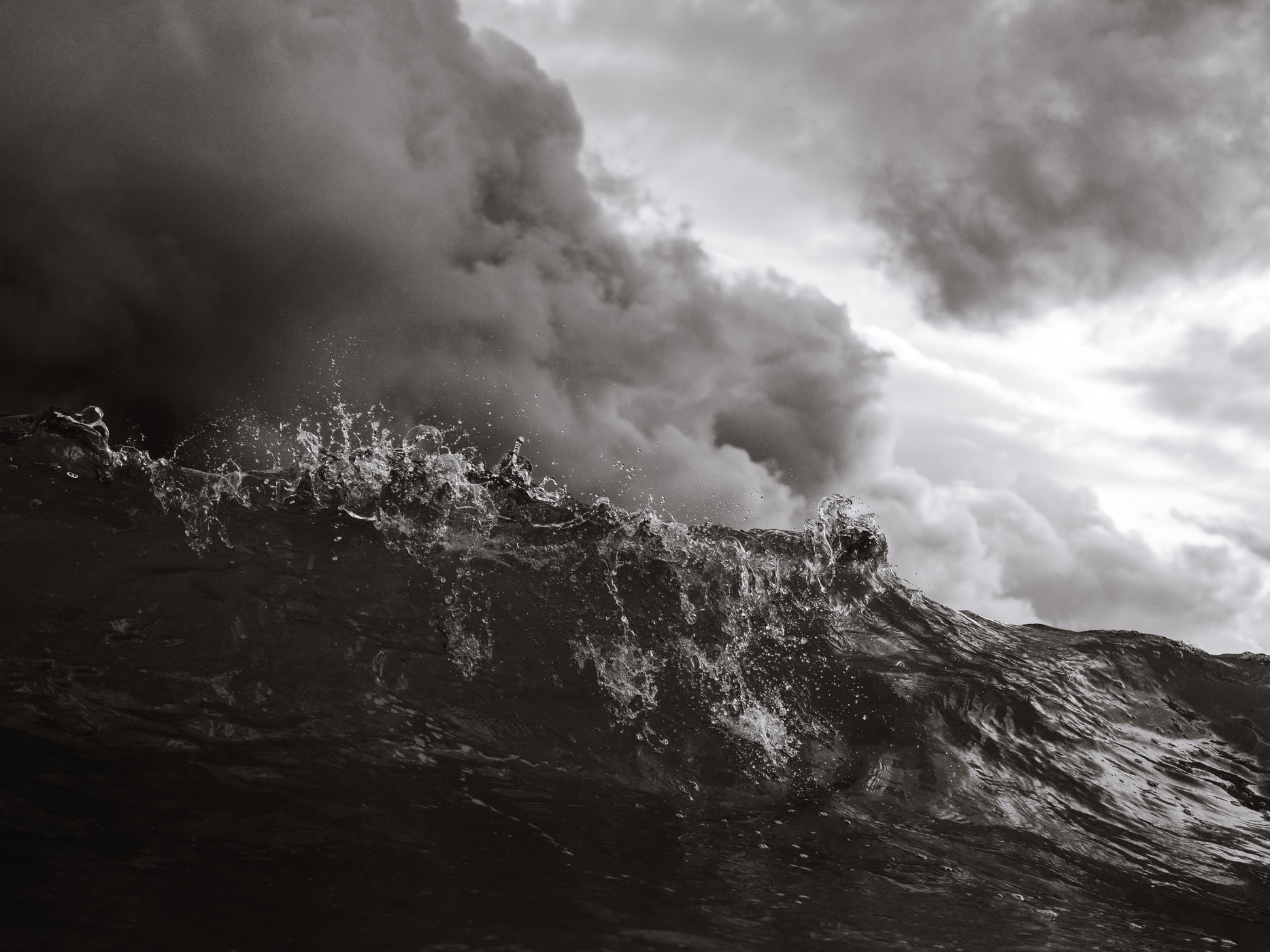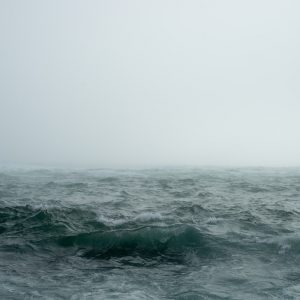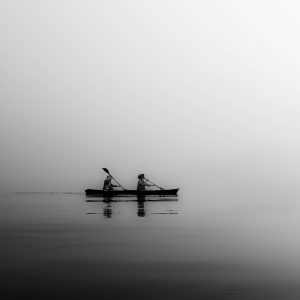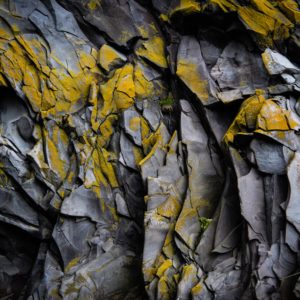Storm clouds drift over the Sea of Japan as if large pieces of charcoal were dragged across the sky. Ryu, the steersman of the fishing trawler Columbo, checks the weather forecast on his phone, flipping through the interactive display. They’ll be heading toward the confluence of two storm systems if they leave now. He scratches the stubble on his cheeks and calls Hori to the wheelhouse. The two men look out to sea, studying the dark waves, trying to reason with the knots growing in their stomachs as a bright, multicolored mass moves across the radar. “It’s up to you,” says Ryu, “but I don’t recommend we stay out long.” Hori turns to look at his grandson, Tamo, telling old legends to his little brother, Kogi. If the family didn’t need the money so badly, he’d wait until the next day. “Let’s head out,” Hori says. “Catches are always best before a storm. We can always turn back.”
§
Urashima Taro walks along the shore and comes upon a turtle being tortured by a group of children wielding sharpened pieces of driftwood. The turtle is on its back, flailing. Speckles of dark blood dot the sand around it. Feeling sorry for the turtle, he scares the children away. The following week, a seal approaches Urashima and informs him the turtle he had rescued was, in fact, a princess and she would like to thank him. Urashima clings to the back of the seal and dives past the reaches of sunlight. For a moment, he forgets about his physical constraints, about his need for air and imagines himself in a starless sky. Water begins to seep into his mouth, his nose. He wants to gasp, and finally with a pained grin on his face he does. Suddenly, something grabs hold of him and a stream of warm air is blown into his mouth. He can’t see what has him but recognizes the impossible similarity of human fingers wrapped around his arms, of human lips sealed tightly around his own, as he descends deeper into the ocean. Below him, a faint glow emerges within a canyon as if shooting stars had been collected. As the light becomes brighter, Urashima sees that it is a woman who has him—a beautiful woman, wrapped in seaweed.
§
The engine sputters and grinds to a stop, stranding the Columbo in the middle of a shipping lane. “I wish you’d stop telling those stories,” says Kogi. “Do you think I’m an idiot? Our father isn’t in some underwater palace like Urashima. He’s dead. His skeleton is at the bottom of the ocean—fish food, probably a nice little house for baby stingrays and moray eels.” Tamo ignores Kogi and continues with the story. It’s been five years, but he knows his brother has just become old enough to feel their father’s death. A worn picture of their father, taken a few months before he drowned, hangs outside the wheelhouse. Kogi busies himself double-checking knots and cut- ting more bait, turning the volume up on his music player. “Dad would have liked the stories,” Tamo says under breath, so his brother wouldn’t hear. But he heard. “Well, you’re a big baby. You’re probably the only one in high school that doesn’t have hair on his balls.” He throws a squid at Tamo but misses.
§
Chinese and Korean cargo ships pass the Columbo at ramming speeds as the rain begins to pour. The leviathans couldn’t slow down in time even if they wanted. As a precaution, Ryu radios the larger ships to alter course while Hori fixes the engine, then calls his wife and baby girl to check in—just in case. Ryu sees his family twice a month if he’s lucky. He keeps a picture of them under his Tokyo Giants hat next to a flattened pack of Marlboro Menthols….
§
When Kogi used to cry all night, Tamo would tell him their father had gone to live in the Dragon Palace somewhere beneath the sea. He has told him this so many times over the years he almost believes it himself. Marine denizens wander the red coral halls and crystalline chambers, serving the deities of the ocean. Giant sea turtles shuttle members of the royal court throughout the labyrinth complex, through colonnades encrusted with pink and crimson anemones. Each side of the palace is a different season, and one day inside equals one hundred years on land. “I’m sure he wants nothing more than to come back to us,” Tamo would explain to Kogi as he fell asleep, “But we would be long dead if he tried.”
§
A lone seagull, separated from his flock, heads for land, pumping its wings against the elements. It tries to avoid being pushed by gusts of wind into the rising sea, pulsating like a net interwoven with thousands of beating hearts. A single raindrop lands on Tamo’s nose. The plastic wind gauge atop the aerial mast makes a rapid turn and then takes another.
§
Within the walls of the Dragon Palace, sea creatures can choose to take on human form or other forms entirely. As Urashima and the princess stroll the gardens, a group of jellyfish approach the perimeter of the compound, marked by pillars of kelp. Urashima watches their glowing, elegant bodies transform into sacks of human flesh as if all of their bones had been crushed or removed. They drag themselves across the courtyard and move like amoebas, emanating a somber, ritualistic cry. The princess explains that the jellyfish were among her father’s first servants; early victims to his infamous rage before old age had calmed him.
§
Hori overhears Tamo as he climbs up from the bowels of the Columbo. Like Tamo, he wants to believe the stories. He pictures his son drifting beneath the waves and looking up at the world he’s left, forgetting the truth: that he had to fish parts of his son’s body out of the ocean after it had been mangled by propellers; how he dove through the bloodied water, grasping for an arm, a foot, what was left of his son’s head, putting what he could find into garbage bags filled with ice until his son’s remains could be burned.
§
Ryu taps out a text message to his wife:
what r u doing? . . . going through a storm. r we meeting next wk?
Caught in the wake of larger ships, the boat rocks and creaks like a wooden
cradle. Pots rattle in the galley and the nets on deck sway back and forth like anx- ious specters. Ryu’s phone plays a dance remix of Peter Cetera’s “Glory of Love” as a meteorologist on the radio predicts gale force winds and swells of up to seven to ten meters on the radio. The phone reads:
talk l8r -at pilates I < 3 u!
§
Schools of fish appear on the sonar, and Ryu shouts to Hori that they should release the nets before the storm worsens. Tamo lowers the ramp and unlocks the trawl wings while Kogi stands beside the net and bait buckets, preparing to monitor the release with his grandfather. Waves crash onto the ramp like ravenous fingers. And as the Columbo increases speed, the net and bait buckets are pulled off the boat, disappearing under the dark canopy.
§
After spending a few days in the Dragon Palace, Urashima asks the princess to send him back. She gives him a wooden box and instructs him to never open it and then kisses his neck to give him gills for the journey home. Urashima marvels at the lights of deep-sea creatures as he rises from the abyss, standing on the back of a turtle. As they rise, sunlight breaks through the water, reflecting off schools of anchovies. Urashima waves his hands through the mercurial cloud before his head rises above the waves. From afar, it looks as if he is walking on water. The turtle brings him to the same place he had rescued the princess. But everything is different. His boat is gone, all the boats are gone and so are the docks he and the other villagers had built. Instead, all Urashima sees are shining towers rising into the sky and millions of people streaming down endless roads.
§
Sensors on the cod-end of the trawl net send back data to the wheelhouse. Fish have begun to fill the net, and Ryu signals Hori who is listening to Tamo’s story. Sheets crash onto the ramp like ravenous fingers. And as the Columbo increases speed, the net and bait buckets are pulled off the boat, disappearing under the dark canopy.
§
After spending a few days in the Dragon Palace, Urashima asks the princess to send him back. She gives him a wooden box and instructs him to never open it and then kisses his neck to give him gills for the journey home. Urashima marvels at the lights of deep-sea creatures as he rises from the abyss, standing on the back of a turtle. As they rise, sunlight breaks through the water, reflecting off schools of anchovies. Urashima waves his hands through the mercurial cloud before his head rises above the waves. From afar, it looks as if he is walking on water. The turtle brings him to the same place he had rescued the princess. But everything is different. His boat is gone, all the boats are gone and so are the docks he and the other villagers had built. Instead, all Urashima sees are shining towers rising into the sky and millions of people streaming down endless roads.
§
Sensors on the cod-end of the trawl net send back data to the wheelhouse. Fish have begun to fill the net, and Ryu signals Hori who is listening to Tamo’s story. Sheets of frigid water flow across the deck. The waves, once lapping gently at the bow of the boat begin to crash against the Columbo, threatening to lift the boat like a giant hand. Hori holds tight to his grandchildren, leading them below deck to take refuge.
§
The streets of Yokohama are frightening to Urashima. Cars are strange, armor-clad carts to him, carrying people at great speeds. Giant, silver birds fly overhead, sending thunder through the skies as they pass. The people on the street are dressed strangely—nearly all of them wearing black, and all seem to be in a rush to go somewhere. Urashima walks for hours, following the flow of people through underground walkways, over bridges, and across busy intersections. At a park, he sees a familiar sight—a bronze Buddha, turned green with age. In front of the statue stands a man, who, like Urashima, does not seem to fit in with the surroundings. The man is wearing a thatched conical hat, a simple yukata, and raised wooden slippers as if he were a farmer tending a rice paddy. A murky film covers his eyes and deep canyons run down his sun-burnt skin. In his hand is a wooden cup holding loose change. Urashima asks the farmer for help, trying to explain his situation. The farmer ignores him at first, gazing out into the busy square like the Buddha behind him. “I know the story,” the farmer mutters. Urashima furrows his brow. “What story? I’m trying to find my family,” Urashima answers. The farmer forces a laugh. “You’re very good. But this is my territory. Go panhandle on the other side of the park.” Urashima doesn’t know what the farmer is talking about. He asks about the story again, if he knows anyone with his family name. The farmer, now uncertain if Urashima is a panhandler and seeing Urashima’s obvious distress, decides to humor him: “One day as a fisherman walked along the shore, he came across a turtle being tortured by a group of children…”
§
In the galley of the Columbo, Kogi is playing Final Fantasy while Hori listens to Tamo’s story and warms up soba noodles on a hot plate, trying not to splash the sauce as the boat rocks. Hori has been through rough storms before but never with his grandchildren on board. If he could have run the family business without the boys, he would have. He turns to Kogi and prays silently. In the wheelhouse, Ryu watches the waves roll under the bow, making course corrections as needed. He calls his wife, but there’s no answer. During their last call, she mentioned an American man who offered to teach her English. Ryu takes the photo of his family out of his hat and mutters, “Gaijin bastard” under his breath. On the radio, the Tokyo Giants are beating Hokkaido’s Nippon Ham Fighters 5-4.
§
As the farmer tells the story, Urashima tries to understand how the world could possibly know of his journey. Is he creating the story or is the story creating him? “And after hearing the story from the stranger in the park, Urashima fell into a deep sadness over the loss of his wife and daughter, both having died hundreds of years ago,” the farmer continues. “He ignored the warnings of the princess and opened the wooden box only to find nothing inside. Wrinkles suddenly appeared on Urashima’s body and his bones contorted and grew brittle until they crumbled entirely. And just before Urashima was turned to dust and swept away by the wind, he heard the voice of the princess, telling him that he should not have opened the box for it contained his old age.” Urashima looks down at the box the princess had given him. If the story is true, he will certainly die if he opens it. He sits on a stairwell with the box between his feet, scanning the exotic landscape for anything familiar. Hunger eats at his belly. People rush past, paying Urashima no notice. As the sun goes down, the crowds begin to thin. Vagrants with shopping carts and soiled tarps emerge from all directions and set-up camp for the night. Urashima, knowing there is no place for him here, closes his eyes and opens the box. The voice of the princess is carried by the wind…
§
Hori is impressed by Tamo’s telling of the legend. Kogi, playing the role of a jealous brother, finds faults in it and boasts he could create a better ending, a challenge to which Tamo double dares him. “OK, you want a story?” Kogi says, after slurping his last soba noodle. He stands up, bracing himself on a counter, almost falling over as the boat rocks, and takes a breath.
§
Ryu takes off his hat and fishes out a crumpled cigarette—his last. The picture of his family, pinned inside, stares back at him as his ears pop from the dropping air pressure. He lights up and checks his phone for messages even though he’s been staring at it the entire day. Ryu wants to provide a good life for his family, but feels hurt and suspicious that his wife doesn’t seem to miss him. She used to check in. But now Ryu has to chase her down. He taps out a text message on his phone: checking in. storm picking up. call me. His thumb hovers over the send button, but he deletes the message and writes: r u w/ the american?
§
And after the farmer finishes telling the story, Urashima looks down at the box the princess had given him. Knowing there is no place for him in the modern world, he closes his eyes and lifts the lid. Suddenly, the air becomes difficult for Urashima to breathe. Bright orange scales replace his skin and spiny fins develop on his torso. Vagrants take notice and begin to gather around. Urashima attempts to stand up, reaching out to one of the drifters but falls to the ground, failing to realize his legs have been fused together. His hair falls out. His head begins to flatten like a ball of flour pressed between two hands, and soon, Urashima begins to resemble more fish than man until only his eyes remain as a sign of his humanity. The vagrants stare in wonderment at the giant fish, flapping helplessly on the concrete. Some of them propose eating it. Others, believing the fish to be a spiritual portent, begin worshipping it, falling to their knees and rubbing Urashima’s orange scales. The farmer, feeling sorry for the stranger he just spoke to, recruits others to help carry the great fish to open water. Ten men on each side hoist Urashima over their shoulders, moving solemnly as if they were carrying a palanquin of a deceased ruler. Children point and alert the attention of their mothers. Crowds grow by the hundreds and helicopters fly overhead. By the time Urashima nears the waterfront, the local media has concocted the following headline: Eco-terrorists recruit homeless into stealing marine research specimens for release. Warnings are issued over megaphones and boats circle nearby with divers at the ready. The farmer and his men count to three—ichi, ni, san—and drop Urashima off the pier. Urashima darts to the depths, past the reach of the divers, under trawl nets and around giant hooks. He keeps going in the cold, dark space of the abyss until the soft, pulsating lights of jellyfish surround him, guiding him back to the Dragon Palace.
§
A loud crackle from the intercom silences Kogi and he almost falls to the ground as the boat violently leans to the side. Ryu has requested everyone on deck; the weather conditions have escalated dramatically. Swells as large as apartment buildings threaten to capsize the Columbo and waves pull at the trawl net below. Hori and his grandchildren work furiously to bring in the net. Rain beats down like miniature harpoons, stinging their waterlogged faces, their pruned and paper-thin fingers. Beneath their feet, wooden planks creak, and stray lines have become animated, wrapping around legs with ease. Hori shouts orders to his grandchildren through the howl of the storm and runs to fetch life jackets from the wheelhouse.
§
“Mayday, Mayday, Mayday. This is the fishing trawler Columbo at 42 degrees, 33 minutes north and 137 degrees, 27 minutes east. Storm conditions have intensified. Engines have stalled. We have four people on board. Is anybody out here?” Ryu repeats the distress call, as he tries to restart the engine. Hori rushes in and opens a box of emergency gear. He tosses the steersman a life jacket and a deflated rubber raft and squeezes the steersman’s shoulder. “I’m going to try and cut the boat free of the net,” Hori says. “You take that raft and my grandchildren if it comes to that.”
§
Tamo and Kogi brace themselves on whatever they can as they try to haul the trawl net with the winch. The net, filled to capacity, slowly emerges from the black waves, but the winch struggles to pull it on board. A large swell hits the Columbo, and the weight of the net pulls the boat vertical like a white monolith in the middle of the sea. Kogi holds tightly to the winch and cries out to Tamo who has lost his footing. A stray line has wrapped around his ankles, dragging him down the ramp, digging into his flesh. He cries out in pain. Kogi dives toward Tamo, trying to unravel the rope around his ankles already soaked with blood. “Cut the rope!” cries Tamo. “Cut the fucking rope!” Tamo claws helplessly. And then, as if he knows he is going to fall, Tamo looks up at his little brother, a look that says, “It’s not your fault. You couldn’t have pulled me up anyway. It’s OK, and I love you.” The winch fails, cables snap, and Kogi scrambles back up the ramp, holding on tight, his body flat against the deck, as another swell tilts the Columbo. When he looks back down the ramp, Tamo is already gone.
§
Hori rushes out of the wheelhouse after the last swell and shakes a sobbing Kogi by the shoulders before diving overboard. He follows the net cables in the darkness with only a chemical glow stick to guide him, probing the water for anything solid until he feels his grandson tangled in the net, Tamo’s arms and legs bent at unnatural angles by the lines, his face pressed behind the patchwork of nylon and wire.
§
Water is filling Tamo’s lungs and his body is fighting for its life but the more he struggles, the more the net digs into his skin. In the cold of the water, Tamo barely notices the pain from the cuts on his body anymore, but can feel his grandfather pulling at him and the current of the sea across his face. Tamo imagines the Dragon Palace shining brilliantly below, its kelp spires reaching out to him as jellyfish guide his way, and then, shortly after the last bubble of air has risen from his mouth, he imagines nothing at all.
§
With his knife, Hori tries to free Tamo. But the lines are thick, and even as he hacks at the lines, Hori knows it is already too late. Under the indigo light of the glow stick hanging around his neck, Hori holds his grandson. He tries to ignore the gashes across Tamo’s face, the way the current moves his limbs like a marionette. He stays with Tamo a moment longer, considering holding him like this forever until another large swell passes, pulling Hori deeper into the darkness and tearing his grandson away from him.
§
Kogi scans the water where his grandfather jumped, hoping his brother will return to him. His lips are shaking, and his skin has aged in the downpour. He asks himself if he could have saved his brother, if he should have done something differently. The questions pull at him with the weight of the dark sky. Although he never admitted it to his brother, Kogi dreams about his father every night. Standing alone on deck, he imagines his father standing beside him, whispering the most beautiful of lies in Kogi’s ears—that everything will be OK….
§
Ryu is sending another distress call when he sees a towering wave building up on the starboard side. He grabs the raft and heads to the deck, grabbing Kogi as the wave topples the Columbo upside down; the force of the rushing water cracks and shatters the windows of the wheelhouse, sending shards afloat. Peter Cetera’s “Glory of Love” begins to play on Ryu’s phone; the music continues underwater for another chorus before fizzling out. Holding Kogi’s hand, Ryu swims clear of the boat and pulls a red cord on the raft, inflating it and shooting them to the surface.
§
In the distance, Hori can see the raft’s flashing distress beacon bobbing over the waves. Kogi sees his grandfather heading towards them and jumps into the water to meet him after tying himself to the raft. Here, in the center of the Sea of Japan, Hori and his youngest grandson cry in each other’s arms. Ryu helps them climb aboard and tries the radio again. The three huddle together, holding tight to both the raft and each other as the storm rages.
§
Hours pass until finally the rain stops. Seagulls cry over the calming waves. And as the sun breaks through the ashen clouds, Kogi notices a large mass approaching from beneath the water. At first, he believes he is seeing things, but as the mass climbs to the surface, Hori and Ryu begin to take notice. From beneath the waves, a large sea turtle emerges and draped on its back, as if he were peacefully sleeping, is Tamo. The turtle swims alongside the raft and the two men hoist Tamo up. “Wake up, brother! Wake up!” Kogi yells. And lying in his grandfather’s arms, Tamo’s eyes begin to open, staring up at sky.
§
The steersman checks the emergency supplies and loads a flare gun in case they see a boat. Lying down, curled into himself, Hori imagines Tamo, drifting into the deepest passages of the abyss, his body mingling with the lost remains of his father. Kogi hangs over the edge of the raft and stares down into the water. He grabs a mask and snorkel from the emergency kit and splashes into the sea, diving deeper with each attempt, hoping his brother is down there somewhere safe, hoping his brother is on his way back to him.
Originally published in Where We Go When All We Were Is Gone (Black Lawrence Press).




